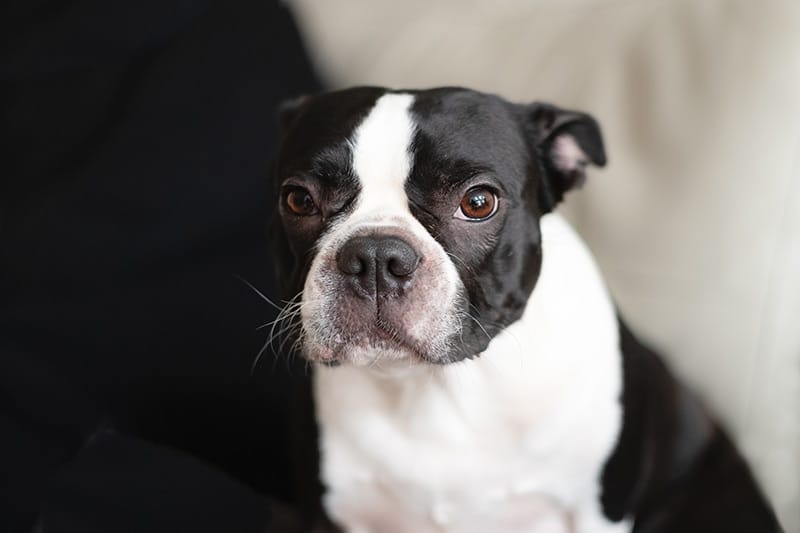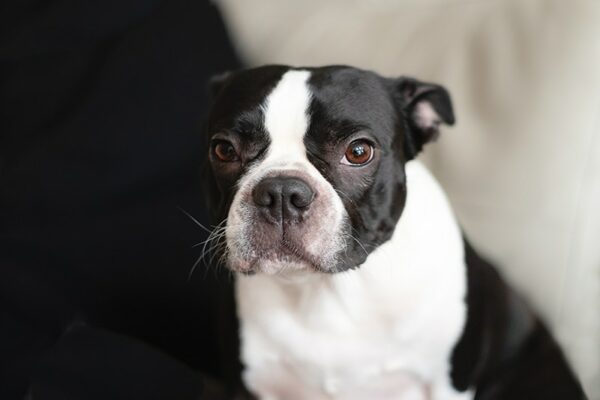Click Below to Skip Ahead
The cheeky and cheerful Boston Terrier is a much-loved canine companion in households all around the world. The breed’s ancestors were produced in the United Kingdom in the 19th century by mixing terriers and bulldog types, but this pooch later found a home in Boston, United States, and was gradually developed over several years into the popular companion we know and love today.
If you’re thinking of welcoming a Boston Terrier into your life, there’s a lot to know about common characteristics, training, dietary requirements, and potential health issues, so read on to get clued up.
Breed Overview
Height:
10–12 inches
Weight:
12–25 pounds
Lifespan:
11–13 years
Colors:
Black & white, black brindle & white, brindle & white, seal & white, seal brindle & white
Suitable for:
Any loving and committed family or companion
Temperament:
Smart, friendly, outgoing, sweet-natured, comical
Often described as gentle but with a mischievous twinkle in their eyes, Boston Terriers’ compact size coupled with their endearing personalities makes these dogs very sought-after. In addition, Boston Terriers are very distinctive in appearance with their stout, sturdy bodies; small, square heads; large, inquisitive eyes; bat-like ears, and tuxedo-like coat color patterns.
That said, all potential Boston Terrier parents should be aware that their short snouts mean these dogs are prone to breathing difficulties, and this is a major cause for concern among welfare organizations like the PDSA. We’ll explain this in more detail in our section on health further down.
Boston Terrier Characteristics

Boston Terrier Puppies
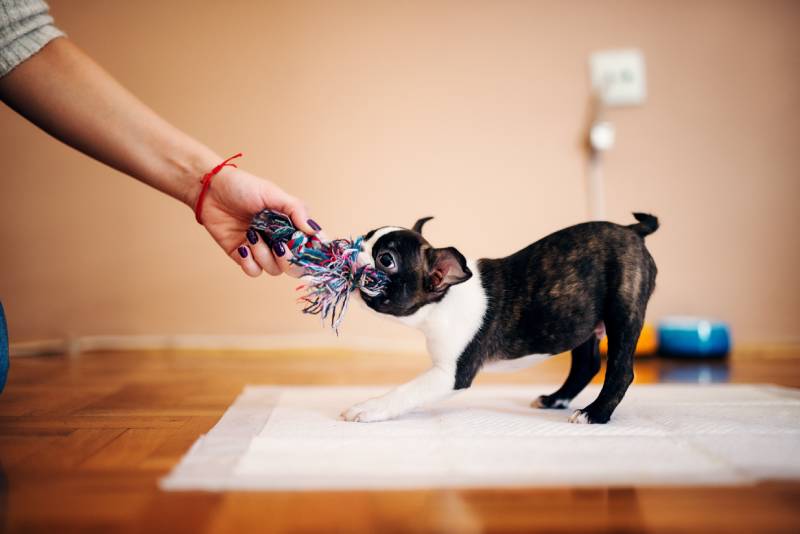
Much like when they’re adults, Boston Terrier puppies are lively, inquisitive, and playful, but these traits are certainly amplified when they’re pups. It’s wise to start training your Boston Terrier as soon as you bring them home, so they develop good habits both in and outside the house.
Boston Terrier puppies are easy to track down, but some organizations—like the PDSA in the U.K—recommend considering mixed breeds and mongrels instead of pure breeds due to the health issues these dogs face. Furthermore, in a 2016 article, it was reported that The British Veterinary Association (BVA) cautions against purchasing flat-faced dogs for health reasons.1
If you’re set on a purebred, adopting a Boston Terrier puppy or adult dog rather than buying one is another option we’d urge our readers to consider. For those set on purchasing a Boston Terrier, be sure to go to a reputable breeder with health screenings in place.
Temperament & Intelligence of the Boston Terrier
Personalities among dogs vary massively, but Boston Terriers have a reputation for being energetic, funloving, and friendly. They’re often sociable with strangers as well as family and friends and thrive on being the center of attention. At times, they can be a bit demanding when it comes to getting your full attention, but setting boundaries early on can help with this.
Are These Dogs Good for Families?👪
Yes. Boston Terriers are very popular family dogs because they’re generally sweet-natured and love being around people. However, you’ll need to make sure your Boston Terrier gets along with everybody in the family by socializing them properly.
This involves getting to know children under supervision, teaching basic commands, and training the dog to be gentle during play while at the same time making sure everyone treats and handles the dog with respect and care. Remember that no matter how big or small a dog is and no matter what breed they are, any dog that’s treated roughly could retaliate without warning to defend themselves.
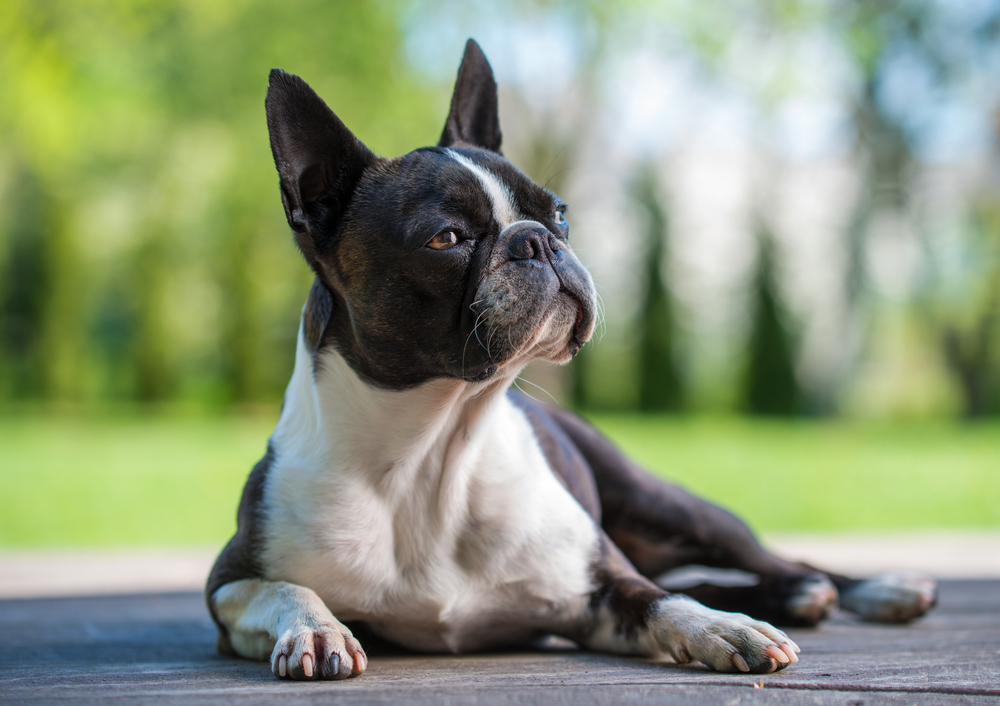
Does This Breed Get Along with Other Pets? 🐶 😽
Generally, yes, but early socialization goes a long way in terms of making sure your Boston Terrier can cohabit peacefully with other pets.
Be sure first introductions are done gradually and under close supervision. It’s a good idea to leash dogs when you introduce them to other dogs or cats for the first time to make sure you maintain control. Letting new pets meet resident pets through a baby gate or screen door at first is also a common method of introduction.
Things to Know When Owning a Boston Terrier
Food & Diet Requirements 🦴
When it comes to picking a brand of food for your Boston Terrier, you’ll need to take into account how old the dog is and any special dietary requirements they may have, like allergies, food sensitivities, or health conditions that could be supported by a specific kind of formula (e.g. joint care, kidney care, etc.). The formula you choose should be complete and balanced.
If you’re opting for a formula based on your dog’s size (small breed, medium breed, etc.), check the guidelines on the packaging to find out if it’s suitable for your dog’s weight. This can vary by brand: What one brand considers medium-sized, another brand could consider small, which is why it’s essential to double-check.
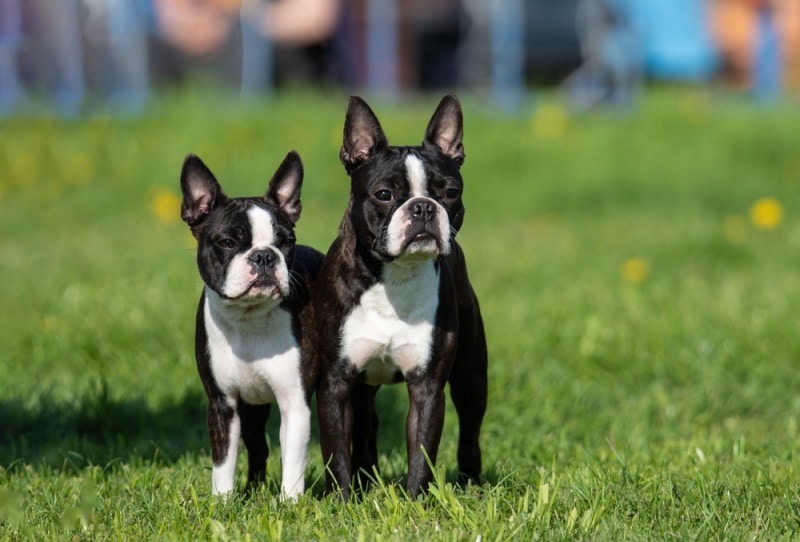
Exercise🐕
Boston Terriers need a moderate amount of exercise. Generally speaking, a Boston needs up to an hour of exercise per day, but the exact amount of time can vary because every dog has different needs. Depending on your Boston’s energy levels, you may need to give them extra exercise in the form of play sessions (ball throwing, tug-of-war, etc.) or allow them to run and explore in a secure area in addition to their one or two walks per day.
Training🎾
Boston Terriers are enthusiastic, clever dogs (though they’re not without a hint of stubbornness) that respond well to training sessions with a focus on positive reinforcement. Another thing to consider is that, since they’re such people-oriented dogs, Boston Terriers can be sensitive to being left alone, so it’s wise to start building positive associations around alone time as early as possible.
Train your Boston to be left alone in increments, starting with a few seconds, then moving on to minutes, then to an hour or two, making sure your dog’s alone time is comfortable and enjoyable. This can be achieved with items like obstacle feeders, interactive toys, and cozy beds. Dogs shouldn’t be left home alone for more than 6–8 hours maximum.
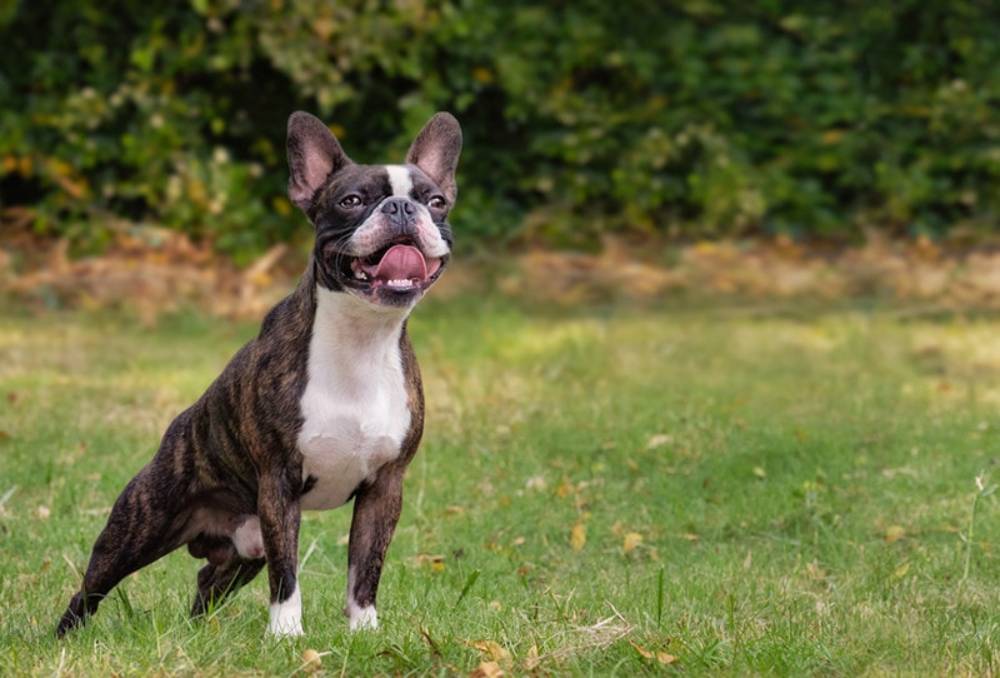
Grooming✂️
The Boston Terrier’s smooth coat is easy to care for and only requires brushing every week or so to keep it nice and shiny and get rid of dead hairs. However, you’ll need to keep an eye on their nails to make sure they’re not getting overgrown and trim them if necessary. Other important aspects of grooming include daily tooth cleaning and regular ear checks.
Health and Conditions🏥
Boston Terriers are prone to breathing issues and are sensitive to heat and humidity due to being brachycephalic, which is caused by their short, smushed snouts and wide skulls. Signs include noisy breathing, snoring, excessive panting, needing frequent rests when out on walks, and overheating quickly.
Management techniques include keeping brachycephalic dogs in good shape, as extra weight can exacerbate the problem. Some brachycephalic dogs have to have treatment or even surgery to improve their quality of life. Please speak to your vet for advice if you have a brachycephalic dog. Other conditions Boston’s are at risk of include:
- Grade 1 luxating patella (this should still be checked out by a vet)
- Mild skin conditions that clear up with treatment
- Eye conditions
- Cushing’s syndrome
- Atopy (allergen hypersensitivity)
- Luxating patella (upper grades)
- Birthing problems
- Spine deformities
Male vs Female
Apart from the fact that male dogs typically tend to be a little bigger than females, there aren’t any significant differences between male and female dogs as companions.
Some say male dogs tend to be more outgoing, dominant, and affectionate while females are more independent and mature faster, but these are just anecdotes—each dog’s personality is unique and is not determined by gender.
If the dog is unneutered (males) or unspayed (females), however, they’re more likely to display certain behaviors. To give a couple of examples, male dogs can become very territorial when they sense a female in heat, whereas females in heat can become clingier and more irritable than usual.
3 Little-Known Facts About the Boston Terrier
1. Boston Terriers Have a Special Nickname
The Boston Terrier’s U.S. origins, tuxedo-like coat, and gentle nature have won them the nickname “American Gentleman”.
2. Helen Keller Was a Boston Terrier Fan
American author and activist Helen Keller had a Boston Terrier called “Sir Thomas”, though he was nicknamed “Phiz”. Sir Thomas was even present at Keller’s lectures at Radcliffe College.
3. The Boston Terrier Is One State’s Official Dog
In 1979, the Boston Terrier was afforded the honor of being named Massachusetts’ state dog.


Final Thoughts
One thing’s for sure: There’s an awful lot to know about these jolly little souls. In a nutshell, they’re big characters and make excellent companions, but the breed is plagued by health issues—particularly breathing problems—due to the way these dogs are bred.
We’d urge anyone considering getting a Boston Terrier or Boston Terrier mix to look into adopting rather than purchasing one. Some organizations are centered around Boston Terrier and Boston Terrier rescues, so that’s a good place to start.
Featured Image Credit: Christine Bird, Shutterstock

